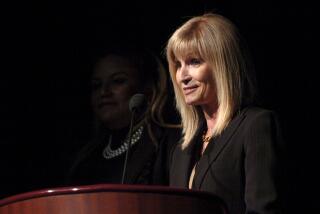Charles Hillinger’s America : Where ‘Little Red Barn’ Is a Big Deal : Mid-America Sounds Beamed From Indiana Radio Station
- Share via
FT. WAYNE, Ind. — A rooster crows. Nancy Lee and the Hilltoppers sing their 1932 theme song, “In a Little Red Barn on a Farm Down in Indiana.”
This is “Wo Wo” radio, 6 o’clock Sunday mornings in Ft. Wayne.
Little towns and farms in “Wo Wo” (Woe-Woe) land light up like pinball machines to hear one of the most popular radio shows emanating from Mid-America--the “Little Red Barn.”
WOWO is Ft. Wayne’s 65-year-old, 50,000-watt clear channel radio station featuring news, music and sports with the vocal logo “When You Need to Know Depend on Dependable Wo Wo.” The call letters stand for “Wayne Offers Wonderful Opportunities.”
The “Little Red Barn” has been a Ft. Wayne fixture since 1926, one of the oldest continuous shows on radio. It’s pure nostalgia, Americana of the airwaves, popular not only down on the farm and in rural hamlets but in big cities as well.
Truck drivers and motorists up that early regularly tune in the hourlong program. “We get tons of mail. You’d be surprised how many thousands of listeners we have at this ungodly hour,” said Sam De Vincent, 71, the show’s producer and lead performer the past 24 years.
“They catch us in 20 states and four Canadian provinces, as far northeast as Maine, clear down to Florida, up and down the East Coast, throughout much of the South and all over the Midwest.”
De Vincent also plays the accordion and sings on the “Little Red Barn” with Nancy Lee and the Hilltoppers, a musical group that has been together 50 years. Nancy Lee, 70, guitarist and singer, is Sam’s wife of 48 years. Jack Carmen, 69, sings and plays banjo and violin. The group has been performing on “Wo Wo” since 1945.
“We play a little bit of everything for everybody on the “Little Red Barn,” Nancy Lee noted, “Dixieland, country, instrumentals, big band, gospel, music from before World War I, from the ‘20s, ‘30s and ‘40s.” The Hilltoppers perform live in studio and the rest of the program’s music comes from spinning old 78s and 45s.
Some songs aired go back to the turn-of-the-century--like recording artist Henry Burr, the Bing Crosby of his day; the Peerless Quintet; and the American Quartet barbershoppers singing old favorites like “Mississippi Cabaret,” their 1914 recording.
De Vincent gives a brief biography and an anecdote or two about the artist. Segments from “Lum and Abner” and other old radio shows are played. Dugan Fry, 50, is the program’s announcer and youngster Pam Geppert, 27, WOWO’s farm service director, gives timely Ag reports.
The “Little Red Barn” bunch takes old poems and breathes new life into the verses. The five performers on the show are old “Garden Gate” philosophers. Anybody in radio-land celebrating his or her 100th birthday gets a special kiss on the air from De Vincent.
For Midwesterners and Mid-American transplants it’s deja vu, turn-back-the-clock, ears-glued-to-the-radio listening as recordings from the 1930s by the old WLS Chicago National Barn Dance “performers” are played.
“Are you ready Hezzie?” the inevitable question is asked as Hezzie (Paul Trietsch) of the Hoosier Hotshots tunes up his slide whistle and the group plays a lively number like “Beatrice, Beatrice, Tell Me What to Do.”
Lulu Belle and Scotty, Patsy Montana and the Prairie Ramblers and the whole Barn Dance gang are regular guests (via the old records) on the “Little Red Barn.”
Listeners send in old records to add to the radio program’s collection. “We tape the tunes and send the records back,” said De Vincent. Sometimes a request for specific recording is made on the air, like De Vincent’s plea on a recent show:
“If anyone happens to have a 1940 Hoosier Hotshot recording of ‘Ivan Scavinsky Scavar’ please send it along to Wo Wo so we can tape it and share it on the air.”
De Vincent is a premier collector of sheet music, records and music books. He has been at it for 60 years, since he was a boy of 12 in Chicago. Last year he donated his collection to the Smithsonian--125,000 pieces of sheet music dating back to 1787, 80,000 different record titles, 800 books.
“Sam De Vincent’s sheet music is possibly the largest and most valuable private collection of its kind--rich in social history, cultural history and black Americana,” Smithsonian curator John Hasse said.
Selections from the collection played by De Vincent over WOWO reflect the diversity and depth of the music performed on the popular, nostalgic Sunday morning radio show in the “Little Red Barn.”
More to Read
The biggest entertainment stories
Get our big stories about Hollywood, film, television, music, arts, culture and more right in your inbox as soon as they publish.
You may occasionally receive promotional content from the Los Angeles Times.








